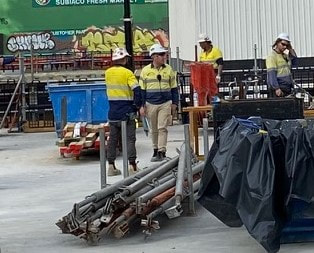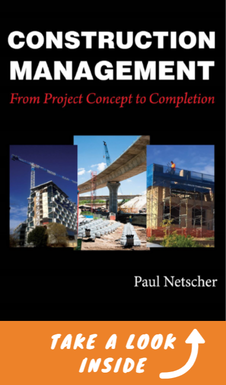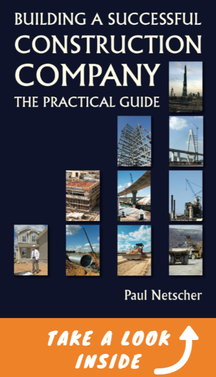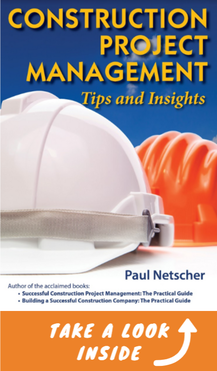"We are often quick to criticise employees for poor work, but we overlook thanking or praising them for a job well done." Try saying these 12 important things on your construction projectNo this isn’t an English lesson, but rather a reminder of some phrases we forget to use, or are too nervous to use in our construction business. Here are a few things we forget to say, or don’t say often enough. Could you be guilty? 1. “Hello” (“Good morning”) – Do you greet employees when you pass them. I knew one business owner who would walk right by people in the office every morning without greeting them. We shouldn’t be surprised that these employees found this hurtful. As managers we are often preoccupied with problems and phone calls and I’m sure I’ve been guilty of not greeting employees. But that worker on your construction project will feel recognised and appreciated if you say hello next time you walk-by. That simple act of recognition, which cost you a few seconds, can make your employees feel more included and appreciated and more motivated. 2. “Thank you” (“Well done”) – We are often quick to criticise employees for poor work, but we overlook thanking or praising them for a job well done. Praise can be motivating. A simple thank you doesn’t cost anything and yet it can reap big rewards. 3. “Help” – You can’t always be expected to solve every problem. Sometimes you have to ask for help and advice. You don’t have to use the advice, but just discussing the problem with someone else can provide a new perspective. Many projects sink further into trouble because project managers have been too proud to ask for advice and have continued on making poor decisions until the project becomes irrecoverable. We all need help sometimes. 4. “Let’s check” (“Are you sure?”) – Too often mistakes are made which simple checks could have detected. Mistakes with prices and quotations, mistakes with measurements, even mistakes in letters and emails. Take a few minutes to check what you’ve done and you may just avoid a costly or embarrassing mistake. 5. “Is that safe?” – Most accidents are preventable and if those involved had stopped to ask this simple question they would probably have done things differently and avoided the accident. Don’t kill yourself or others because you didn’t stop and ask; “is this safe?” Why should we take construction safety seriously? 6. “Is there an alternative?” (“Can we do it differently?”) – We often accept the first solution without considering alternate methodologies, alternate solutions or alternative materials. There are usually many ways of doing something - more than one may be right - but we should always be looking for the best solution. It may be time for the old dog to learn some new tricks. The way you’ve always done something may no longer be the best solution anymore. 7. “Will we be paid for that?” (“Did we allow for that?”) – I’ve found that contractors often do work for free. Sounds unbelievable! Yet project managers sometimes don’t read the contract so aren’t aware of the basis of the quotation and what the client’s obligations are. They are also sometimes guilty of performing extra work without a written instruction. When you receive an instruction, or open a new construction drawing, ask the question; “did we price to do that work? Will we be paid?” Are you working for free on your construction project? 8. “I don’t understand” (“Can you clarify that”, or “I’m not sure what you mean”) – All too often we make assumptions when we aren’t sure of something. This is particularly dangerous when pricing a project when the request for pricing isn’t clear. It can be very costly when you incorrectly assume something. I’ve encountered many problems on my projects when drawings weren’t clear and people assumed something which in fact was incorrect. Don’t be too proud to ask questions – no question is too stupid, especially when the answer could save money, and even sometimes lives! Just as important is to not assume that the person you are giving instructions to understands what you are saying or knows what you want. The Contractor's Duty to Ask Questions 9. “No” (“Sorry we can’t do that because;…” or, “Sorry we can’t do that but maybe we could do this;…”)– I’m sure we’ve all accepted a project schedule that’s too short, or been bullied by a customers into giving a discount or reducing our price to fit their budget. We’ve probably lamented these actions later when we finished the project later than the agreed date, or lost money on the project. Maybe we’ve regretted not saying no to an unsafe act? Employees and customers can be demanding and it’s often easier to say yes when they ask for special treatments or exceptions, yet this may lead to more demands and problems later. Of course we shouldn’t get into the habit of only saying “no”. I’ve known people whose first response was always “no” – “no” can sometimes be over used and destructive. Learn to think before you say “no”. If you do say no it’s often useful to offer an alternate solution, or at least give reasons for the negative response. 10. “We should do it like this because; ….” – Sometimes we expect our crews to blindly follow our orders and rules. Safety is a prime example where companies and customers seem to have endless rules and regulations. On some projects there is often a culture of non-compliance of these rules. But, maybe if our employees understood the cost of their non-compliance, the potential implications to their and their fellow workers safety and health, they might just be more inclined to do the correct thing. It’s time we stopped saying: “you do it this way because those are the rules”, or “that’s the way we do things around here”, or “that’s what the boss says”, or “it’s my way or the highway”. Your crew deserves the respect to know why we should do things in a certain way, and understanding the reasons will probably make them more likely to do as requested. Explaining why we do things in a certain manner is also part of the mentoring process. 11. “Are we proud of that?” (“Am I proud of this?”) – Many quality problems arise on projects because of a lack of pride or a lack of care. Will you accept the quality of the item in your house? Will you be proud to show your work to your family? Our customers are paying for a quality product and we should be committed to delivering it to them. Does anyone give a …. anymore? 12. “Let’s celebrate” – Construction isn’t an easy business and there are numerous problems encountered on a daily basis, so when there’s a substantial success embrace and celebrate it. Everyone wants to belong to a successful team – success is empowering, infectious and motivating. "Everyone wants to belong to a successful team." Good Communication is Essential for a Construction Project ManagerHow many of the above words and phrases do you use? A large part of construction management is about managing and motivating people. Good communication is essential. Don’t be too proud or arrogant to use certain phrases. Take a few extra minutes out of your day to use some of these phrases and you would be surprised by at the results you get on your projects - they could just save you millions and earn you a whole lot more respect from your crews. Does your manager forget to use some of these phrases? How does that make you feel? Do you regret not saying something you should have? Good communication is essential in construction Please share this post This article was first published on the ClockShark website - Get The Industries' #1 Time-Tracking AppRunning a field service or construction business takes coordination and a great team. With ClockShark you get the industries' #1 timesheet app Please share this post Learn more about Construction Project Management"Very useful guide regarding the management of the construction projects. Open, direct and insightful." To read more about the author’s books and find out where you can purchase them visit the pages on this website by clicking the links below:
'Successful Construction Project Management: The Practical Guide' 'Building a Successful Construction Company: The Practical Guide' 'Construction Book reviews' To read more about the author visit the page 'Paul Netscher' Want to contact Paul Netscher please enter your details on 'Contacts' Find out how Paul Netscher can help you Order your books from Amazon Order your books from Amazon UK © 2016 This article is not to be reproduced for commercial purposes without written permission from the author. construction management construction project management
1 Comment
Enrique
14/9/2022 11:26:16 am
Thank you so much, I would like this activity to continue, God bless you.
Reply
Leave a Reply. |
Archives
June 2024
Note: We welcome genuine comments, especially comments that add additional information to the subject matter in the article. We however reserve the right to remove inappropriate comments, which includes comments that have nothing to do with the subject, comments that include inappropriate language, and comments that are an advertisement for a product or company, or which include an advertising link. Comments must be in English. We will not enter into discussion on why a particular comment was removed.
CategoriesCopyright 2016 - The attached articles cannot be reproduced for commercial purposes without the consent of the author.
The opinions expressed in the attached articles are those of the writer. It should be noted that projects are varied and different laws and restrictions apply which depend on the location of the contractor and the project. It's important that the reader uses the supplied information taking cognisance of their particular circumstances. The writer assumes no responsibility or liability for any loss of any kind arising from the reader using the information or advice contained herein. "I have what I consider some of the best books on construction management."
Books are available from: Amazon.com Amazon.co.uk takealot.com kalahari.com Amazon.in Amazon.de Amazon.fr Amazon.it Amazon.com.au Powell's Fishpond uread bokus Amazon.ca Amazon.es Other retail stores Available in paperback or on Kindle "28 YEARS OF CONSTRUCTION PROJECT MANAGEMENT EXPERIENCE, DEVELOPING SUCCESSFUL CONSTRUCTION PROJECT MANAGERS AND BUILDING SUCCESSFUL CONSTRUCTION COMPANIES"
|








 RSS Feed
RSS Feed




